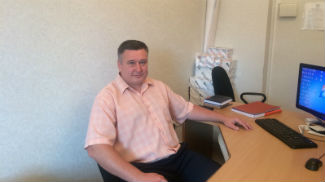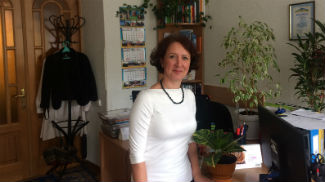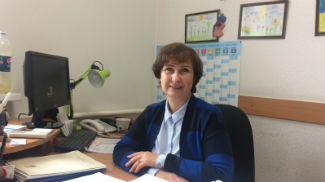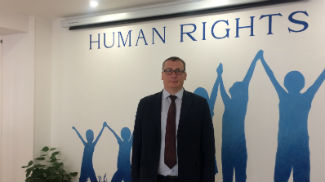Ukraine is striving to align with European human rights standards

“We received expert advice on how to identify violations in the penitentiaries and make NPM recommendations to the relevant state agencies and the reasonable terms for implementing these recommendations. All complying with European standards”, Netsvetaev said. “The project experts prepared the methodology of the follow-up monitoring visits, and we will apply the prescribed methodology standards during our visits to the 4,700 places of detention in Ukraine”.
He underlined that the recommendations attracted attention of the prosecutor's office, which filed a few criminal cases and now is trying to systemise the complaints to control the situation.
Netsvetaev suggested that their recommendations did, indeed, encourage the employees of the detention institutions to strive for a better result. “The very fact that the recommendations are being provided, positively motivates the managers to improve the conditions in the penitentiaries as they wait for follow-up visits”, he said. He gave a small example of improving the daily life of inmates, “In the Zaporozhye region we encountered a situation where detainees did not have tea cups and they had to drink tea from their plates”, Netsvetaev said. After our recommendations, we made a follow-up visit and saw that they had new cups and dishes.”
“The European experts provided us with valuable support 
Current legislation in Ukraine does not address all issues. For example, if the water supply to the mentally-ill is not mentioned in the law, they will not have water until the expert group reveals this and makes its recommendations. “There is still lots of work to be done to change the regulations”, Sergienko said.
The Ombudsperson’s Office received expert support in the implementation of the NPM at the central and regional level
 European experts discuss mechanisms to combat discrimination
European experts discuss mechanisms to combat discrimination
The Ombudsperson’s Office received expert support in the amendment and implementation of the anti-discrimination legislation as well as awareness raising of public servant on the issue.

“With this new legislation on anti-discrimination adopted in 2012, we still lack the practical tools to solve the issues. A number of trainings and workshops armed us with knowledge to better understand the challenges and methodology to identify discrimination”, Filipishyna said.
The project organised a number of events and trainings, such as training for people who faced discrimination and the first all-Ukrainian student forum. More than 300 participants from 130 universities attended forum in Ukraine in 2016. “The students learnt about the best practices on anti-discrimination, the ECHR case law from the judges of the European Court and University tutors”, Filipishyna said. She added that prominent human rights defenders in Ukraine also introduced European best practice concerning discrimination, health care, gender equality and sexual orientation.
Public servants of eight Ukrainian local government bodies learnt how to identify cases of discrimination and how to deal with them, as well learning about the mandate of the Ombudsperson’s office and its work towards preventing discrimination.
“With the help of European experts, we considered research possibilities to implement a methodology for an anti-discrimination expertise of draft legislation”, Filipishyna said. “This is a practical tool that we handed over to the government so that they would issue it as a methodological recommendation to the Ministry of Justice of Ukraine”.
The project also issued practical manuals on preventing and combating discrimination for various categories of employees: police, judges, businesses, medical workers etc. “This is a practical help that the can be used every day at work”, she said.
 Increase in the trust in Police
Increase in the trust in Police
Around 70 staff members of the newly established Human Rights Directorate and 2,700 police investigators from 9 regions of Ukraine took part in the training on human rights standards.

The project also provided expert advice on a number of draft legislation including: On National Police of Ukraine, On Private Detective Activity, On Misdemeanours, On Operative Search Activities, On Public Assemblies, The Code of Ethics, on the National Police.
“The recommendations to the draft legislations are very sophisticated, but we need to improve implementation”, said Tarasenko.
Ukraine could achieve some ambitious goals, such as consistently providing detainees with lawyers. “There are almost no complaints about this massive violation”, said Tarasenko. “Also, we could fix a number of issues, including the exact time of detention, a clear indication of the period of detention and control over the complaint records against the Police”.
Tarasenko suggests that the new methodology for collecting complaints and data resulted in a tenfold increase in number of complaints. “The credibility of the Police is raised when people see that their complaints are recorded and being considered”, he said.
 Distance learning courses HELPs judges, prosecutors and lawyers
Distance learning courses HELPs judges, prosecutors and lawyers
A number of distance learning courses, “Evidence and proofs”, “Prohibition of Ill-treatment in law-enforcement, security and other coercive contexts” were developed through the Human Rights Education for Legal Professionals (HELP) programme, according to Iryna Shevchuk, a certified HELP trainer, a lawyer and an expert involved into the development of the HELP course on “Labour Rights in the light of the ECHR”. “The courses were developed with due regard to the situation in Ukraine, and were successfully piloted among judges and prosecutors”, she said.
Ukraine’s national resource for human rights training became more sustainable through the training of trainers on HELP methodology and ultimately through the creation of a pool of 50 certified HELP trainers representing different legal professional groups – judges, prosecutors and lawyers.
Shevchuk suggests that lots of the materials provide practical solutions to the issues, and the entire course includes examples and case studies. “The labour rights course, for example, highlights a widespread abuse concerning the employers monitoring employee e-mails or video surveillance in the workplace”, she said. “Evidently, this would attract the attention of many people who want to participate”.
Underlining the benefits of the courses, Shevchuk noted that in Ukraine one can refer to the case-law practice of the European Court of Human Rights. However, for an ordinary lawyer with no idea about the practice of the European Court and the doctrine of autonomous concepts, and how much they coincide or do not coincide with the domestic legislation, it is extremely difficult to interpret a decision of the Court, and accurately apply and draw the right conclusions. “Therefore, these courses are of practical value for local human rights practitioners”, she said.
The project “Strengthening the implementation of European human rights standards in Ukraine” ran from 1 January 2015 to 31 December 2017. It was part of the European Union/Council of Europe Partnership for Good Governance in Eastern Partnership countries, this was a four-year joint programme with a budget of €36 million. It was funded 85% by the European Union and 15% by the Council of Europe, and was implemented by the Council of Europe.
